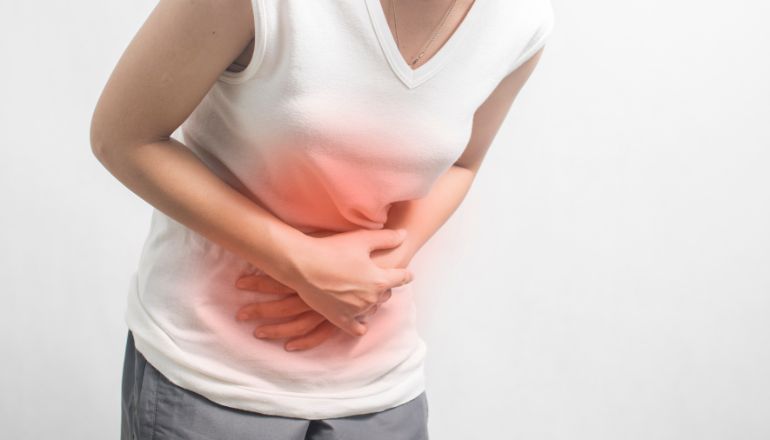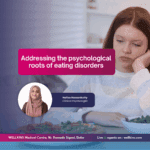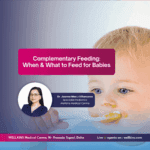Author: Dr.Sagnika Dash (Specialist Obstetrician and Gynaecologist – WELLKINS Medical Centre)
“I was a kid when I was dealing with pain so severe that it led to blackouts and I never asked for help”
Pain during menstruation affects one in 6 women. Despite being so common, this condition is not given enough attention as it has been accepted to be a normal part of growing up. While most of the girls and women suffer from some discomfort, it’s important to identify the impact this pain might cause. It has been observed that pain during periods can lead to missing school days, missing office to sometimes missing exams and important meetings. So what is normal and what pain warrants a doctor’s visit?

What’s the cause of pain during periods?
“Pain is, by definition, a sensory and emotional experience associated with actual or potential tissue damage”
During the process of menstruation, the uterus undergoes spasms to expel the menstrual blood. Among young girls, due to the high muscle tone of the neck of the womb(cervix), the process of blood flow through the cervix is a painful phenomenon and presents as a pain during menstruation without any other problems in the gynecological organs. This type of pain is called a Primary Dysmenorrhea.
Sometimes pain occurs due to some underlying disease or disorder, such type of pain is called as Secondary Dysmenorrhea. Some of these causes can be the following.
- Problems of Bowel including irritable bowel syndrome
- Related to Urinary system.
- Endometriosis (Inner lining of the uterus is present outside the womb and bleeds during every menstrual cycle causing pain)
- Adenomyosis
- Muscle spasms
- Infection of Gynecological or non-gynecological organs
- Trapped nerves
- Social or psychological
Often there is more than one cause to pain and in the initial assessment , it may not be possible to identify a cause.
How is Pain during periods assessed?
To assess a pain, sufficient time needs to be given to the patient
- It begins with your history: the patient’s story is the most important when it comes to diagnose the cause and choose a treatment.
- Many women fear that their pain will be dismissed and termed Psychological : That is why it’s important to speak out if the pain is distressing and affecting your life
- Most women are advised by their friends and family to ” not to take any pain killers”: This myth needs to be addressed as in certain cases like endometriosis, an early treatment will have better outcome in the future.
- This is followed by Examination and performing certain blood tests and scans to find more details.
What can you expect during a Doctor’s Visit?
- Listening to your story
- Performing an examination( Only if you agree to it i.e. with your consent and in the presence of a chaperone)
- Doing some blood tests and scan
- Screening for infections
What if no cause is found out? Is this a dead end?
At times, a cause of the pain cannot be found out in the conventional way and some additional tests might be required to formulate a management plan.
- Doing a MRI can help us understand more about the structural problems
- Advanced tests like a Diagnostic laparoscopy can be done to see how things look inside the abdomen and identify early endometriosis
- Additionally, If the cause seems psychological, there are many experts who knows how to deal with it.
Pain during menstruation affects one in 6 women. Despite being so common, this condition is not given enough attention as it has been accepted to be a normal part of growing up. While most of the girls and women suffer from some discomfort, it’s important to identify the impact this pain might cause. It has been observed that pain during periods can lead to missing school days, missing office to sometimes missing exams and important meetings.
What are my options for treating the pain?
Management of the pain mostly depends on the cause.
A combination of therapies including medical and surgical and sometimes counselling can go. A long way in managing the pain and preventing it to return. And YES, you can stop the medicines if you get better!
Spasmodic pain: As the womb tries to push out the menstrual blood , the muscle contraction causes pain which is comparable to pain during heart attack! yes you read it right. The mechanism of this type of pain is loss of oxygen to the muscles as they are contracting vigorously
Solution: Simple anti spasmodic tablets will be able to relieve the pain and would not alter the menstruation.
Inflammatory: certain women have infections or growth of some tissues in the womb or in any organ nearby which can undergo a swelling and causes a pain which is described as a congestive pain/feeling heavy
Solution: Anti inflammatory medicines like ibuprofen is helpful when the cause is suspected to be inflammatory (special caution in patient having poor kidney function)
Ectopic Endometrium/ Endometriosis: The presence of tissues similar to inner lining of womb will cause one to bleed inside the tummy whenever they have their menstrual bleeding, any bleeding inside the tummy is painful and can be severely disabling. Thats why most of the women having endometriosis are severely affected with pain and need an early management to prevent long term impact on fertility.
Solution: reducing the overall volume of bleed with Hormonal contraceptives.
Nerve irritation: In certain cases where the pain seems completely neurological/nerve related , a trial of medicines for nerve pain can be prescribed. These medicines are prescription only and cannot be purchased if you self-diagnose.
Psychological cause:Human brain is a myriad of memories and experiences hidden in the subconscious. One needs to be open about the possibility that something which has happened in the past has the power to affect your present and not everyone can deal with all the situations which life throws at you! If you can’t deal with it, take help.
Solution:Treating a psychological cause of pain entails counselling sessions along with some medicines to help you cope with the triggers.
How would you know what is the cause of your pain?
Mostly it would be clear after multiple visits to a doctor and telling your story . At times its difficult for anyone to pick up a single cause . Yet, a lot can be done to make your life easier. The choice of treatment depends on the following;
- Why do you want a pain relief?
- What is your fertility status/are you planning for a pregnancy?
- and finally are you willing to take the treatment and perform the investigation suggested?
Every medicine comes with its side effects but contrary to the popular belief, taking pain killers during menstruation will not make you infertile.

Finally, the red flags that you should never ignore and visit a doctor as soon as these appear.
New bowel symptoms over 50 years of age
- Bleeding per rectum
- New pain after the menopause
- Pelvic mass
- Suicidal ideation
- Excessive weight loss
- Irregular vaginal bleeding over 40 years of age
- Postcoital bleeding
A mild discomfort or pain is expected during menstruation but one which throws life off balance is certainly something which nobody should deal with. As our knowledge about certain conditions like endometriosis is increasing, we realize how it impacts the health and fertility of women. Women with endometriosis mostly have pain during menstruation, and eventually they do face challenges during conceiving.
It is okay to take pain killers during painful periods as they are safe , effective and ensure a better quality of life.
Do visit your gynaecologist when you have pain that is unusual, intolerable or throws you off balance. Choose a medication as per your health status. Take the least amount for the shortest period! Remember, that no one needs to deal with pain when we have safe and effective treatment available.







